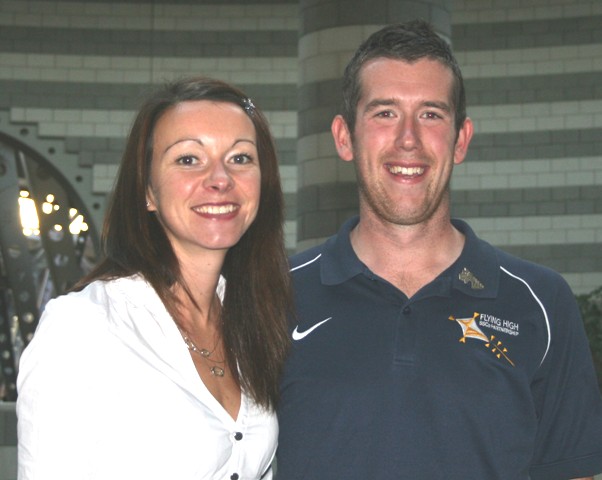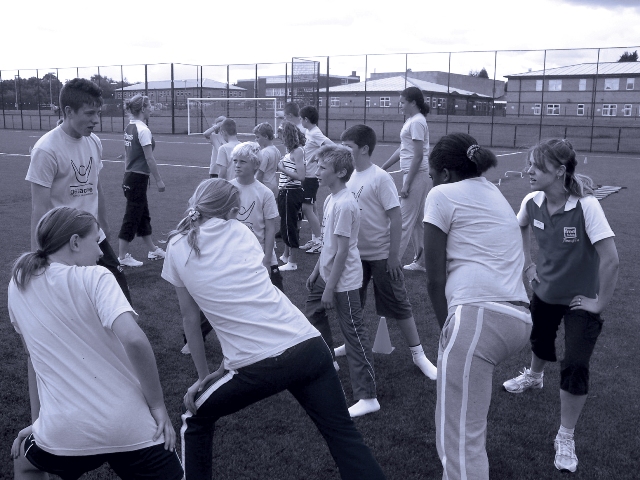
Flying High: Lindsy Gray and Andy Lockwood
Flying High in Donny
Flying High, the top of a four-level scale of engagement and commitment used in education, has been adopted as the brand name by one of the two school sports partnerships that service the South Yorkshire town of Doncaster. The Leisure Review met partnership development manager Lindsy Gray and her right-hand person, Andy Lockwood, and got a crash course in excellence.

Flying High: Lindsy Gray and Andy Lockwood
Within minutes of meeting partnership development manager (PDM) Lindsy Gray it is clear that the name Flying High is more than a catchy piece of marketing as she explains what she believes are the pre-requisites for success in her job. “The real value of people with a sports development background,” she said, “is that we’ve grown up on partnership working, networking, knowing what’s out there, being able to pull in a number of providers and organisations, managing people, managing resources, managing budgets, managing infrastructure, writing development programmes, writing strategic plans, looking at the long-term vision.” Whether consciously or not, she defines the ‘flying high’ behaviours of a sports development professional and her partnership is certainly a leader in its field, acting more like an excellent local authority sports development unit or a switched-on county sports partnerships than a agglomeration of schools’ PE departments.
At the time of the interview the comprehensive spending review was still weeks away and its potential repercussions could only be guessed at but it was clear even then that Gray and Lockwood were not timidly awaiting their fate. Instead both had challenged the standard operating procedure for people in their types of role and worked with the Youth Sport Trust (YST) to deliver the agency’s core messages with programmes moulded to fit local need. After four years of The Leisure Review trying to have an open and honest exchange of views with anybody from the YST the two relatively young people were a breath of fresh air.
The YST is the brainchild of Sue Campbell, now Baroness Campbell of Loughborough, who has nurtured the Loughborough-based agency over two decades with first millionaire John Beckwith and then a combination of education minister Estelle Morris and maverick sports minister Kate Hoey helping drive exponential changes in the organisation’s influence. At the centre of the trust’s work has been the network of school sport partnerships (SSPs) which has been an established, if somewhat detached, part of the sport system since 2001. The core funding that secretary of state for education Michael Gove has now cut provides support for one half of the Flying High offer and will do until August next year, providing support to the school sport co-ordinators and the primary link teachers whose job it is to ensure quality PE is delivered in both curriculum and after-school slots. However, with a prescience that many business leaders would envy and sadly unlike many of her fellow PDMs, Gray has developed another side to her structure. “On the other side [of the partnership structure diagram] is the stuff we have grown and developed ourselves based on the needs of young people and what we feel the gaps are,” she said. The programmes offered by the posts represented on the community side of the diagram read like a checklist of the areas into which sport was supposed to be moving once the successful partnership with education had been brokered by Campbell. Once Campbell had achieved the seemingly impossible by marrying education funding to sports development ends there was hope that by delivering on other agendas sport could embed itself in the matrix of government funding rather than being a ‘non-statutory’ luxury. Unfortunately, on a macro scale, sport never did develop the sustainable relationships with health, community safety, crime diversion or social services that were going to embed physical activity in the nation’s psyche or the government’s spending plans. In Doncaster those partnerships are thriving but with the SSP structure being dismantled Gray, Lockwood and their team will have to build rapidly on their diverse community base.
The fact that Flying High has developed along such diverse lines is testament both to the management team’s entrepreneurial attitude and to their varied background. “I did sports development as a degree,” Gray explained, “but went down to Oxfordshire when I graduated and worked in the voluntary youth sector for the largest youth charity in Oxford as a youth development manager. I was working with excluded young people and young people on part-time timetables providing a number of participation programmes across the county. I moved up to Doncaster to work for a local authority re-engagement programme and then in both school sports partnerships.” Lockwood’s career path has been more straightforward: “Physical education and youth sport at university, then into youth work through sports coaching and local authority sports development. I moved into the school sports partnership as a competition manager initially and then assistant partnership development manager.” Gray is quick to point out the strengths that her more laconic number two brings to the team: “Andy has a real wealth of knowledge of governing bodies, sport structures and coaching which is invaluable.”
Significantly neither one is an educationalist but when challenged on this omission Gray’s response is direct. “The majority of PDMs that I have met are from a PE background rather than sports development and I think they bring a different angle to the job,” she said. “Certainly our initial remit was – and is – to provide high-quality physical education and to encourage young people into competition, into leadership and into clubs. I do believe that if we don’t get it right in PE then we are never going to get them to go on to any of those other areas and so the curriculum element is vital.” This is the way Flying High team has managed the challenge of providing knowledge of the curriculum and physical education has been key to their success with schools. “We buy in specialists to deliver those elements of the programme where we may not feel so confident or we may not be accepted, not having that PE background.” This approach has led to Gray developing positive working relationship with educational consultants that in turn has led to the creation of scalable, and therefore marketable, support packages which may prove a major benefit going forward.
When asked to speak about Flying High’s relationship with the YST Gray smiled and invited Lockwood to answer. “Overall I think the relationship is good,” he said. “Sometimes the focus does shift quite quickly in terms of priorities. Obviously that can be a reaction to the government of the day but I think in recent years the focus has gone away from the PE side towards the added extras and the added extras – the coaching, the volunteering, the club links, the community engagement – are the areas being targeted by funding programmes. That’s where a lot of the monitoring we have to do is focused.”
A brief canter around the current PE offer, which started at two hours of “quality PE” for every child, went up to five and has now reduced to three but has never been satisfactorily defined, allowed Gray to explain what really sets the Flying High partnership apart. “Core budgets have remained the same over the years but the increases to programmes and to the staffing infrastructure have been huge, which is where we have been fairly clever,” he said. “To deliver all we want to deliver we can’t just rely on money coming down from the Youth Sport Trust. This is so much bigger. We have to capacity-build ourselves which, thanks to our backgrounds, we have been able to do. At the moment we are all waiting for the [comprehensive spending] review to find out whether school sports partnerships have a future and we are at the end of a three-year cycle of funding. We hope funding continues but services, and often vital services, will be cut.”
Read that again against the current backdrop and it is easier to see why Sue Campbell has vowed not to be beaten. With people like Gray and Lockwood in the trenches who wouldn’t carry the fight on.
It is a mark of the pair’s adroitness that plans were laid as far back as a year ago to ensure that the loss of central funding would not mean the loss of the Flying High service altogether. “Last year we set up a community interest company (CIC) that runs at the side of the partnership called Flying Futures,” Gray said. “It acts like a community enterprise and we have been able to put lots of our work and the delivery of programmes through it. We have also been able to attract funding from third sector funding organisations because of the way it is set up. We are very keen on making what we have built up sustainable.” At this point Gray then said something which exposes Michael Gove’s argument for what it is, politically based bunkum: “ What is worrying for us is that, if all this goes, there is going to be a decrease in participation, not just in PE but in extra-curricular and community sport. We have built up so much capacity that, for example, in Doncaster we are the sole providers of teacher and coach education.”
Unlike others in the sports system who, faced by the same uncertainties, had chosen to “wait and see”, Gray had been assuming the worst will happen and putting contingencies in place. “The school where we are based is becoming a trust school next year and we are exploring with the chief executive and the governors whether the new trust will be interested in taking on some of our programmes.” To help ease the transition the partnership has been altering their ways of working: “Over the last six months instead of offering things for free we are demonstrating the impact that we make and we’re selling our services, seeking to make enough money to pay for the posts such as the young people development officer for next year and beyond. We are marketing ourselves on everything we deliver. People can buy resources we produce nationally, they can buy in our coach deployment service, our coach education service, our leadership training packages. We are moving across into other subject areas and offering leadership packages around literacy, numeracy and foreign languages based on our sports leadership awards. And that’s what schools are interested in, the core subjects.”
Gray is clearly switched on and is aware of the past and current political situations but she also has a strong grasp on what the future might hold. “If funding moves away from physical education, and we have been very well funded over a number of years and it has made a huge impact, then we have to be wise to what schools will buy in. It’s about the core subjects. That’s our angle. We’re using what we’re good at to deliver in other areas and looking at whole-school provision.”
Now that the tidal wave that was the comprehensive spending review has hit and even Sue Campbell’s seemingly impregnable ship has been holed below the waterline there is one part of South Yorkshire where a lifeboat has been under construction for some time. They say there is a dearth of leadership in the sport, leisure and culture sector but perhaps they are looking in the wrong place.
The Leisure Review, November 2010
© Copyright of all material on this site is retained by The Leisure Review or the individual contributors where stated. Contact The Leisure Review for details.
Download a pdf version of this article for printing
